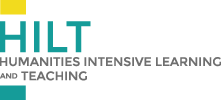Courses 2018 · PA
- Advocacy by Design
- Collections as Data
- Connecting Digital Humanities to Public Audiences [CANCELED]
- Developing Black Digital Humanities Initiatives
- Digital Methods for Interdisciplinary Cultural Studies
- Digital Surrogates: Representation, Engagement, and Meaning
- Help! I’m a Humanist! — Humanities Programming with Python
- Spaces and Stories in the Black Public Humanities
- Text Analysis
Instructors
-
Warning: Undefined variable $page_object in /home/dhtraining/public_html/hilt/wp-content/themes/hilt-child/single-hilt_course.php on line 84
-
Thomas Padilla
Visiting Digital Research Services Librarian University of Nevada Las Vegas
-
Mia Ridge
Digital Curator British Library
Description
A growing amount of interest has been dedicated to an emerging orientation to collections referred to as “collections as data”(ex. 1, ex. 2, ex. 3). Generally speaking, work in this space seeks to explore what might be possible if cultural heritage organizations began to think about, prepare, describe, and provision access to digital collections in ways that promote their amenability to computational use. During this course librarians, archivists, museum professionals and allied collection stewards will explore how to approach providing collections as data. The course will consider lessons learnt from earlier work on open cultural data, image releases and APIs in the digital cultural heritage sector, and discuss the implications of thinking of collections – metadata, digitized texts, images and objects – as data. Possible user communities served by or providing models for this work include but are not limited to Digital Humanities, Data Science, Data Driven Journalism, and Digital Social Science.
Concretely, participants will (1) be exposed to case studies of established and emergent collections-as data work from a variety of institutional contexts (libraries, archives, museums) (2) consider differences and commonalities across a range of user communities (Humanities, Social Science, STEM, and more) (3) build on lessons learned derived from existing real world implementations of collections as data (4) consider how collections have been used by digital scholars and creatives and (5) discuss the principles and ethical dimensions of collections as data work.
Please prepare for class by reading: Santa Barbara Statement on Collections as Data, Reprogramming the Museum, Collections as Data Position Papers, and some quick tips for getting started with collections as data drawn from the recent Collections as Data Forum 2 and join the collections as data zotero library.
Location
Room 623 (Humanities Conference Room) Williams Hall

